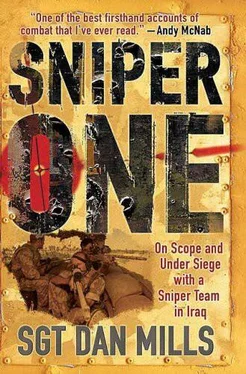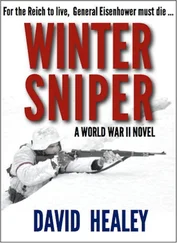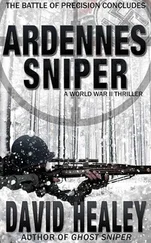Most of the house’s rooms were out of bounds for us. We were also ordered to have very little to do with the minor CPA folk, on their own request. There was a lot of tension between us, and none of it was our making. They were keen for us to keep as low a profile as possible because they didn’t want the locals thinking the military had come to make war. We were supposed to be on a smiley happy peacekeeping tour, and we had to behave like it.
The nicer toilet blocks were set aside for them too.
‘You’ll also have to eat meals at different times to them,’ said the NCO. ‘It’s what they made us do. It helps them pretend we’re not here.’
I supposed that made them feel like they were really helping the people of Iraq. Twats.
The tour ended with Cimic House’s wide, flat roof. Up there hung a solitary red, white and black Iraqi flag. It was there instead of a Union Jack to prove to the locals we were there for them.
As soon as we got up there, I knew immediately where my platoon would be spending most of the next seven months. Our job was to be the eyes and ears for the company; to log, report and observe anything that looked like insurgent activity. With the most potent and longest range weapons system, we were also its best deterrent. The roof was not only the highest spot in the compound, it also had a 360-degree view over much of the city. A three-foot-high wall even ran all the way around it for cover and to rest our longs on. All in all, it was our ideal location — a sniper’s Shangri-La.
‘Right boys, this is our new office,’ I swiftly announced. ‘No fucker comes up here without our permission. This is sniper territory from now on. Put the word around.’
It was important to claim the roof as quickly as possible, before another platoon like Recce got the same idea.
OK, Cimic House was overcrowded, our housemates were obnoxious, and outside the walls there was a jungle. But crucially, in the roof we now had an excellent place to work. On tour, everything else comes second to that.
The more we saw of our new home, the better it got. My mood was lifting by the minute. There was a proper cookhouse with real tables and chairs, not a tent full of plastic furniture like in Camp Abu Naji. It was run by a couple of military chefs in a mobile kitchen trailer. They did everything from chips and curries to fry-ups and ice cream, and a fresh fruit bowl every day. On Friday nights, they even threw on a barbecue.
One last treat awaited us in the palm-tree-lined garden, a luxurious remnant of Saddam’s day when his governor in Maysan lived there like a prince. Ringed by its own wall and a cooling thatched veranda was a 15-metre-long swimming pool. It was fully functioning too, thanks to the efforts of previous units. A little outdoor gym had been set up beside it, with exercise bikes and punch bags.
All in all, it really was quite a promising spot — a haven of calm in a storm of shit. Having been prepared for the worst on the grim drive in, we were chuffed to bits with the place by the end of the look around. We were also delighted to be away from the rest of the battle group stuck inside Abu Naji. It meant we could do our own thing, well away from the RSM’s moaning about haircuts, saluting and all that crap.
That evening I sat on the benches outside the cookhouse beside the river with Dale. There was a patio right on the corner that overlooked the Tigris where it split from its tributary. From there, you could watch the sun set behind the palm trees while fishermen in ancient looking canoes paddled past. There was even a little table tennis table.
We treated ourselves to a fresh, cool glass of orange squash (on this dry base, orange squash was as good as it got) and put our feet up. All over the city, the mosques had started to wail to call people in for evening prayer. For a moment, sitting out there almost felt a bit like being on some Mediterranean holiday. It was certainly a pleasant change to the freezing windowless underground bunk rooms of South Armagh.
‘This is all right, isn’t it, mate. What does sir think of the view?’
‘Well, I don’t mind telling you, Danny, if it wasn’t for that faarkin’ toilet of a city the other side of the fence, I could spend six months here with some ease. If we have to be tree huggers, I’m all on for tree hugging in comfort. Any fool can be uncomfortable.’
Not that we thought it would ever come to it, but militarily it was also an excellent place to defend. With water on two sides, there was little chance boats would make it across without us giving them a fair pummelling first. And the front and back sangars gave good arcs of fire, not to mention our all-round view from Cimic’s rooftop. Two final buildings perched on the riverbank on the northern edge of the compound completed its prospect, a tall water tower and water treatment plant.
The only downside was the Pink Palace, the governor of Maysan’s office and seat of power located the other side of the road from the front gate, which we were also tasked with securing. It was an ugly two-storey block shaped in three sides of a square. It was known as the Pink Palace because it was pink. But we called it the Pink Sauna on account of how hot it got in there. If there was ever any air con in it, it didn’t work now. For some reason the poor design meant almost no clean air would ever pass through it either. It stank terribly. A third-rate architect had tried to make it look like a palace, but all it resembled was a naff Arab mansion. Technically, it was the seat of the governing council of Maysan. They didn’t govern anything at all, because the Americans did all that. But it didn’t stop them turning up to shout at each other all the same.
I spent the rest of that first night on the rooftop with a couple of pairs who had set up their longs. Our task was to log, report and observe anything that looked like insurgent activity. Mortar firing positions were our top priority. They were easiest to locate at night because the round will give off a bright flash when it ignites at the bottom of the barrel.
There were no attacks on us. But we heard shots fired all over the rest of the city. Once we knew all our call signs out had been accounted for, we relaxed, sat back and just enjoyed the show. Little zips of red or yellow tracer would suddenly shoot up over the rooftops. Sometimes it was far away, other times closer. It was like a fireworks display.
Most of it was tribal shooting, power struggles between different gangs. Some of it was celebratory fire. To mark a birth, wedding or a funeral, it’s customary for Iraqi men to unload a full AK mag into the skies. They don’t give a shit where the rounds land. It’s not uncommon for totally innocent bystanders to be killed.
Excrement aside, there were other fascinating smells I hadn’t come across before: the perfumes of the souks, and the spices of Arabic cooking. And in the mix from somewhere, a permanent smell of burning.
Even at night, we were still sweating because we weren’t used to the heat. But thanks to a good breeze up there, the rooftop was always the coolest place to be.
Then Pikey ruined the whole romantic image in one fell swoop.
‘Jesus Christ, it’s 1 a.m. and I’ve still got the Niagara Falls running down me crack.’
‘Thanks for that, Pikey. Just carry on drinking as you were told.’
At the start of the tour, we were getting through 20 litres of water a day. It was the only way to rehydrate while our bodies acclimatized. Water is a good business to be in in Iraq. Vast crates of two-litre bottles would turn up on trucks, and we’d go through them like locusts. We were forever pissing — I never knew I could piss so much. But after a little while we were back down to drinking just a couple of litres a day. It’s amazing how adaptable the human body actually is.
Читать дальше












